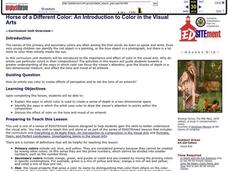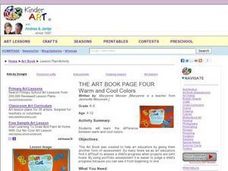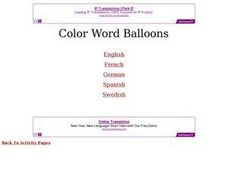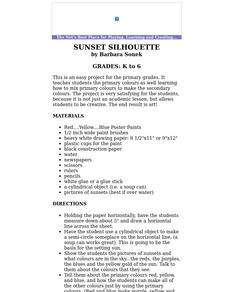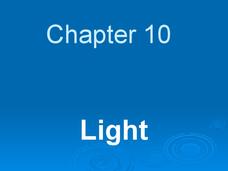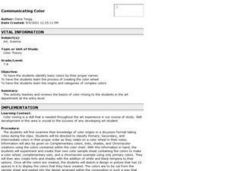Curated OER
Spicy Hot Colors
Second graders investigate the book Spicy Hot Colors. In this colors instructional activity, 2nd graders experiment mixing paint and creating different colors. Students make text to world connections and record their responses and draw...
Curated OER
Warm/Cool Leaves
Young scholars examine the difference between warm and cool colors. They discuss the basic color wheel, reviewing primary, secondary and complimentary colors. An activity allows students to discover how to mix the warm and cool colors.
Curated OER
Horse of a Different Color: An Introduction to Color in the Visual Arts
Students examine how artists use color to create a sense of depth in a two-dimensional space. They view and analyze prints, complete worksheets, and write a paragraph on how color is used to draw the viewer's eye to a central figure.
Curated OER
Color Wheels and Schemes
Students explore how to use the color wheel in selecting fabric colors for a quilt. They define and demonstrate monochromatic, complimentary, and analogous color schemes. Lesson plan and worksheets are attached in .pdf and .doc formats.
Curated OER
Color My World
Second graders experiment mixing primary colors to form other colors using frosting.
Curated OER
Warm/cool Colors - Page 4
Students draw pictures that make them feel either warm or cool using only the warm and cool colors.
Curated OER
Let There Be Light
Students explore the relationship between light and color. They explore the NineColours computer program, blend colors, create a slideshow of hues of colors, and conduct an experiment using a flashlight and colored cellophane.
Curated OER
Color Word Balloons
In this color word balloons worksheet, students color six hot air balloons the color that is written underneath each balloon. Students utilize the colors of yellow, green, blue, orange, red and violet.
Curated OER
Sunset Silhouette (primary colours)
Young scholars draw and paint the sunset, learning about the primary colors while painting and mixing.
Mr. E. Science
Light
Where does bad light end up? In a prism! The presentation covers light, mirrors, lenses, and the structure of the eye. It also provides explanations of reflection, refraction, concave and convex mirrors and lenses, and a comparison of...
Curated OER
Easter Egg Eggstravaganza
Students identify functions and proper use of the computer. They identify secondary colors by mixing primary colors. Students reinforce listening, speaking and following directions by playing a game. They identify the color gold.
Curated OER
Tasty Color Mixing
Students discover the "magic" of color mixing in this fun, elementary lesson using vanilla cake frosting, food coloring, mixing bowls, popsicle sticks, and plain vanilla cookies (optional). Emphasis is placed on the difference betweeen...
Curated OER
The Art and Science of Impressionist Color
Discover Impressionist painting as students investigate the 19th century combinations of colors characteristically used. Students experiment with their own paintings, utilizing primary and secondary colors.
Curated OER
Color Wheel Project
Students review the relationship between primary and secondary colors. As a class, they are introduced to the tertiary colors and use photographs to show them in a room design. To end the lesson, they create a new color wheel with...
Curated OER
Color Wheel Introduction
Pupils are introduced to the primary and secondary colors. Using a worksheet, they follow the directions from their teacher to complete the activity. To end the lesson plan, they use the worksheet to create a separate color wheel.
Curated OER
What You See Is What You Get
Pupils explore light and colors. They see how white light is made up of various colors. They need to have some background knowledge about prisms, light wave lengths, and behavior of light, primary and secondary colors, and ratios.
Curated OER
Color
Young scholars study the elements of color in paint and light. For this color science lesson, students discuss colors in their world, white light, and rainbows. Young scholars mix three primary paint colors to make various secondary...
Curated OER
Elements of Art: Student Assessment
What a neat test! The class is asked to draw and color to create examples of eight elements of art. They focus on each element (line, value, shape, form, space, texture, primary and secondary color) by creating an original piece in each...
Curated OER
Spinners of Color
Students review primary, secondary, and intermediate colors. They use a worksheet to select the combination of colors they want to try on the spinners. They predict the outcome of the spinning colors.
Curated OER
Introductory Activity for Color Unit: Edible Color Wheel
Young scholars use food coloring and frosting to make an edible color wheel. They identify the primary colors and experiment with mixing colored frosting to produce the secondary colors. Students then eat their color wheel.
Curated OER
Communicating Color
Students identify basic colors by their proper names. They explain the process of creating the color wheel and explore the origins and catagories of complex colors.
Curated OER
Color Worksheets for Preschool and Kindergarten
In this color worksheet, students trace the color words by following the dots. Words are printed in the color they represent. Other color recognition activities are included with this page, such as a rainbow flash card game.
Curated OER
Mixing Colors
First graders, exploring and experimenting with the primary colors of red, yellow and blue, mix different colored icings together to create other colors formed with primary colors. The color wheel is also discussed and shown during this...
Digital Dream Lab's Art Game Swatch Out!
Why did we create an art game? Teachers reported to us that students struggle in art the most with composition of colors. For example, students often think "pink" is composed of random colors or that pink is its own color, instead of...




